Why Hearthstone's new Mercenaries mode is like mac 'n' cheese
Fun? Deep? Pay to win? Our thoughts after five days with Hearthstone's Pokémon-like battler.
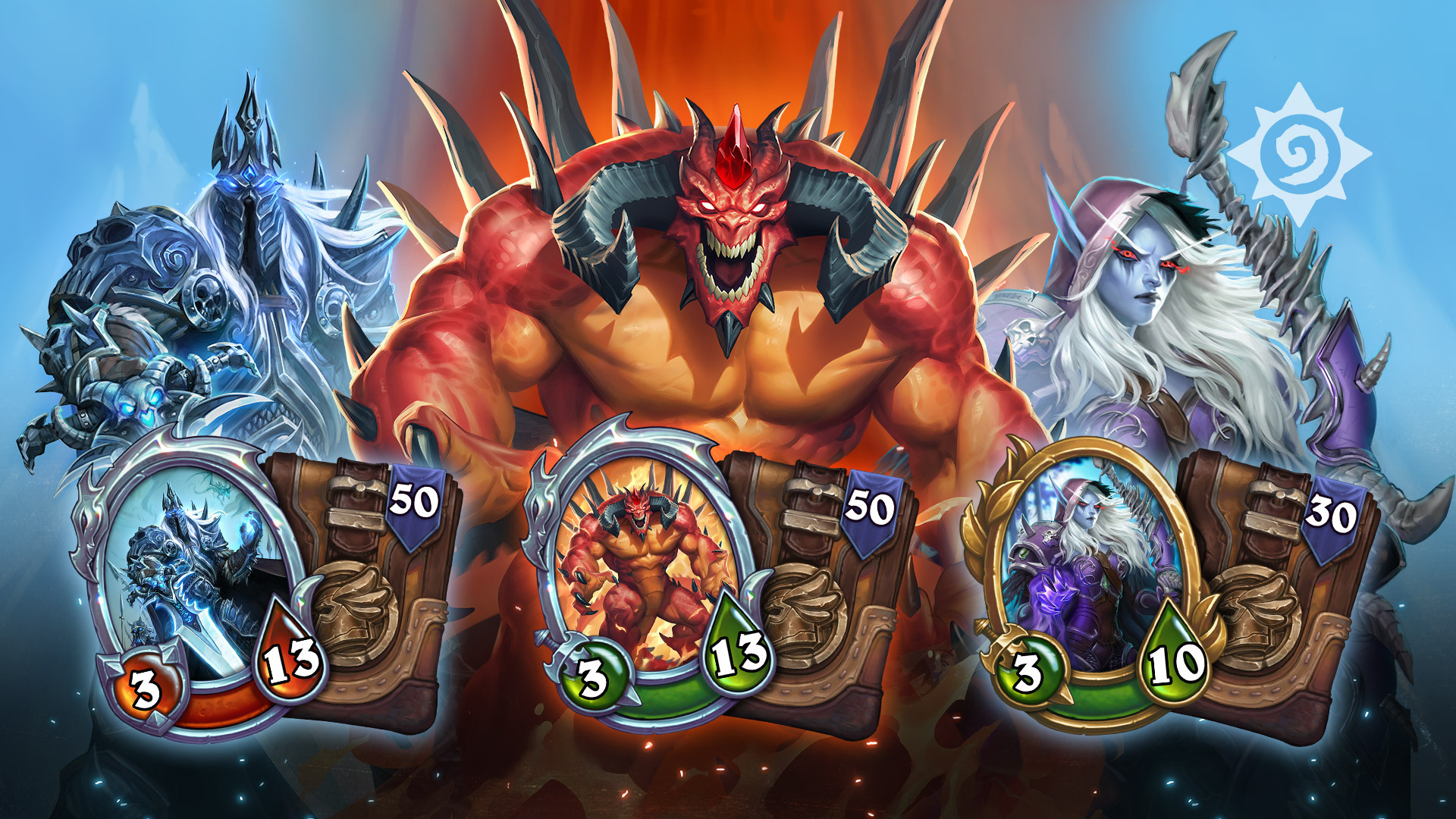
It's tempting to view Mercenaries as the answer to a question posed by Blizzard's accounting department: How can we replicate the runaway success of Battlegrounds, but, y'know, make real money rather than rely on easily ignored cosmetics? Tempting, but cynical. Having spent five days with Hearthstone's newest mode, which launched today, I can say this is one of the most substantial additions the game has received. There's plenty to play here, regardless of how much time or money you want to spend. The point of Mercenaries isn't to replace Standard or Battlegrounds. Mercenaries' job is to meaningfully expand the menu on offer once you log in.
The rollout of the mode, at least in terms of presentation, has been rocky. Until recently, players were barely sure what it even was. A strange discussion at BlizzConline in February with no gameplay footage was followed by a leaked survey a few months later. Then radio silence until September's disastrous showcase. The timing also couldn't have been worse, as Activision Blizzard had been sued the month before for serious allegations of pervasive workplace discrimination and harrassment. The fallout from the lawsuit rightly necessitated dialing back all game comms, including the planned buildup for Mercs, which went from desert to deluge over the course of an hour-long stream. Despite the info overload, players were still left wondering where the gameplay was.
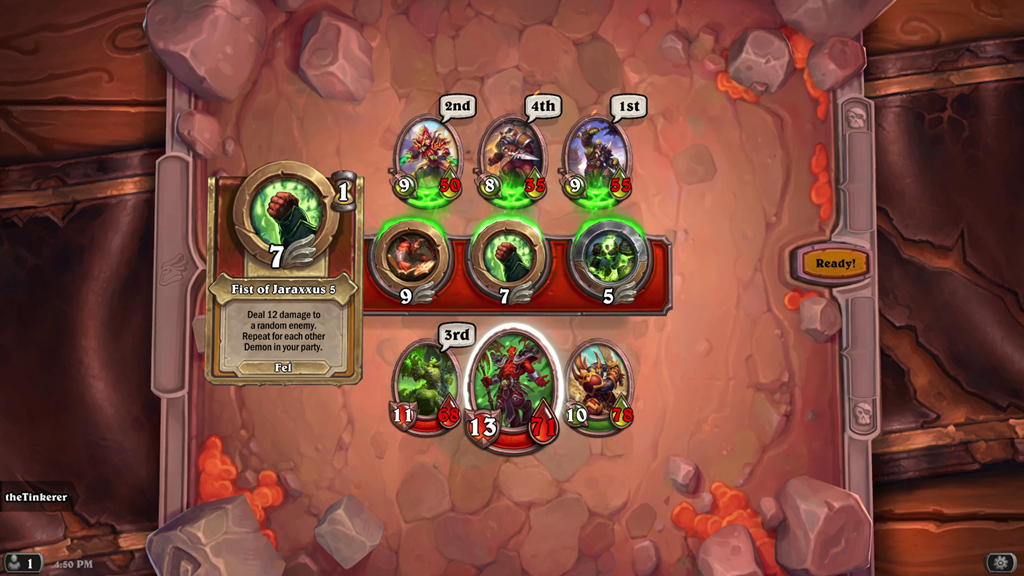
Protection racket
The basics are simple: You assemble a team of six collectible Mercenaries who each have a 'role'—red Protectors, green Fighters, and blue Casters—and a unique set of abilities, each of which has both text and a preset 'speed' value. Only the first ability is available at level 1, but the other two come online after a few runs. At the start of each battle, you pick three mercenaries to fight while the others sit on the bench. When a round begins, you direct your chosen squad to queue up abilities and targets. After both sides have picked, every ability plays out in sequence from fastest to slowest. Protectors deal double damage when attacking or targeting Fighters,
Fighters do double to Casters, and Casters do double to Protectors. Each character's level 1 ability is something that does damage, whether directly or via the new keyword 'Attack', which works exactly as you imagine. Every Mercenary has their own spin on how they deal damage—Cariel attacks and heals herself on final blows, while Xyrella has a fast direct damage ability that reduces the attack of the Merc she's targeting for a turn. If used wisely, she'll save your life.
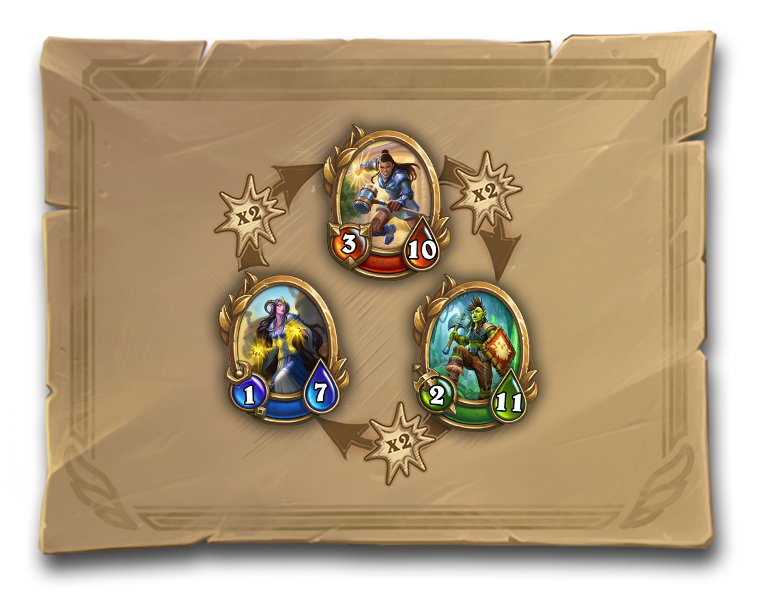
Many players immediately made the comparison with Pokémon, and in practice it holds. Teams of six, "super effective" attacks, and a predetermined ability pool per collectible character all evoke Nintendo's megafranchise. But there's more to Mercs than just Grass beats Rock and Fire beats Grass. In the late game, minion abilities become dizzyingly complex and there are synergies that will take tons of time to explore. What it definitely does have in common with Pokémon, though, is fun.
Drag and drop
Increasingly, it feels like Team 5's approach to new modes is to find an existing genre, cut out the crap, polish the presentation, and deliver an experience that's easier to pick up but just as hard to master. Everyone who's delivered lethal with a giant Edwin or put together a busted Battlegrounds comp knows the satisfaction of big attacks landing with crunchy audio and explosive visuals. Mercenaries doubles down on all that, and the combat feels great, whether it's Millhouse Manastorm boosting a giant Arcane Explosion or Blademaster Samuro buffing himself and attacking twice for big chunks of damage. It feels fast, too—abilities zip across the screen quickly and there's very little downtime, unlike the tense but protracted anticipation of seeing a Battlegrounds round play out.
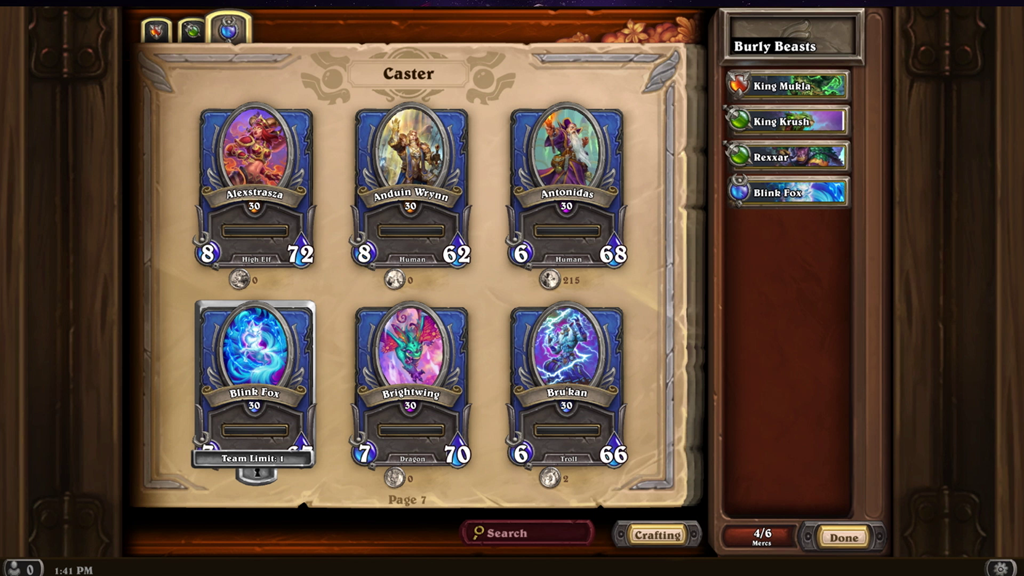
Shrug, drag your green ability onto a blue enemy, and hope for the best.
Even though there's basically no randomness within the combat, other than when two abilities have the same speed value, I found it exciting to see what each turn would bring. There's an extensive set of challenges offered in PvE, which is where I spent the majority of my time during early access, and the solo campaign does a lot of things that constructed Hearthstone and Battlegrounds are sorely in need of. For example, following a short tutorial, complexity is layered in gradually via a bunch of gently guided tasks featuring well-established characters.
Keep up to date with the most important stories and the best deals, as picked by the PC Gamer team.
Even with the meticulously constructed onboarding, the fights move so quickly that they can be dizzying at first, especially during this initial release phase. In PvE, you're able to inspect your opponent's minions to see what abilities they've queued up. But this means that you can either spend your turns (which are untimed in PvE) mousing over enemies repeatedly to figure out exactly what's going to happen... or you can shrug, drag your green ability onto a blue enemy, and hope for the best. That's mostly what I ended up doing, but the feeling of leaving more optimal decisions on the table in order to avoid endless reading never went away.
Going it alone
Each PvE run drops you into a Slay the Spire-esque map featuring a series of encounters, with a special event or boss encounter at the top in order to earn some resources if you win—usually coins to upgrade your Mercenaries. After each encounter, you get a random 'Treasure' that boosts a character (or your whole party) for that map only, often with abilities that feel like they'd be pretty overpowered in a PvP setting. What PvE in Hearthstone has been missing for years is a reason to keep playing. Dungeon Run and the subsequent four iterations wore out their appeal after so many variations on the same basic idea—and with all due respect to the Book of Heroes and Book of Mercenaries one-off campaigns, Mercenaries feels like it's a lot closer to finally delivering meaningful Hearthstone solo content. The reason for that is persistent growth.
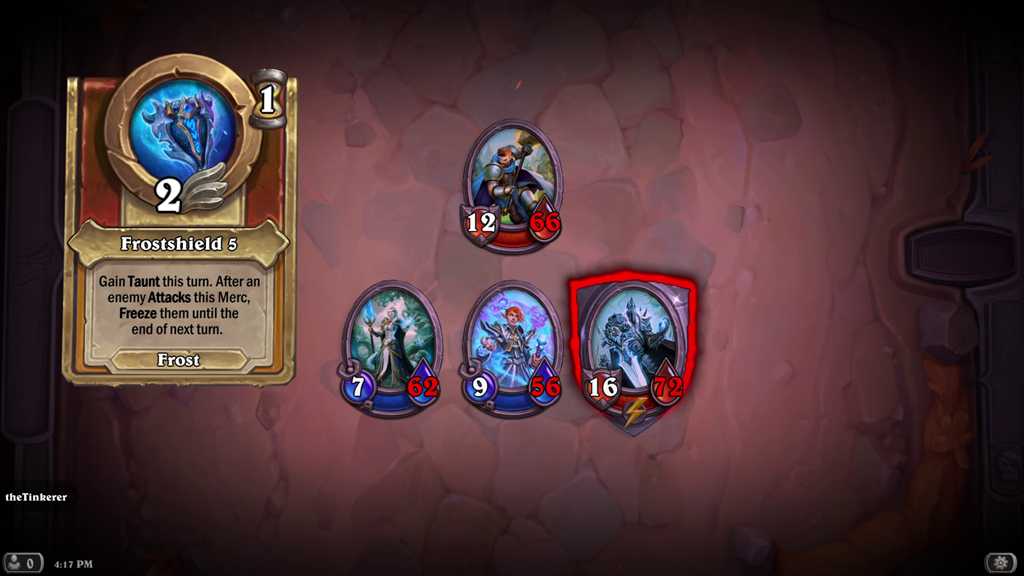
Each of your Mercenaries gains XP after they fight and can level all the way up to 30, unlocking second and third abilities along the way, as well as equipment that changes how they fight, sometimes in minor ways via stat boosts like Rokara's passive +5 health and sometimes in major ways like The Lich King's powerful Frostbite ability also targeting neighbors. Abilities and equipment can also be upgraded (once unlocked) with coins specific to that hero. Leveling all the characters you like is going to take serious time, and since most Mercs are opened randomly from packs, each player will end up with a different experience here.
It's hard to say whether this is going to remain a satisfying gameplay loop or become a grindfest.
It feels like there ought to be a ton of replayability, provided the maps themselves hold enough variety, and on the Heroic difficulty runs are no joke. These feature more encounters, more enemies in each fight, and they all have thicc stats. Based on my current playtime, it's hard to say whether this is going to remain a satisfying gameplay loop or become a grindfest, but the challenge provided by Heroic mode, combined with the excitement of seeing your party's treasures come together in powerful combos, is pretty enticing. I found myself picking Heroic over Normal just so I'd get another couple of rounds with the treasures. Turns out it's fun to flashily dunk on nameless Quilboars.
Welcome to the pits
For those looking for even stiffer challenges than the AI has to offer, Mercenaries has its own PvP in the form of the Fighting Pit. The matchmaking algorithm is necessarily complex, given the nature of the mode. It will try to find a team with similar power while also looking at your comp. So, if you have a team of all Casters, you won't run into six Fighters and get run over. Once again, this seems like a lesson learned from the work the team has done with MMR in every other mode.
If the matchmaking can't find an acceptable opponent, you'll be paired against AI designed to put up a good fight against what your comp is trying to do. This system remains in place until the very highest levels of competition. Oddly, it almost feels as though leveling isn't really necessary for PvP, since you'll be facing opponents tailored to your exact level, but given how many possible hero, ability, and equipment combos there are, you can bet that the most competitive players will swiftly rise above the AI bracket and field some truly bonkers builds.
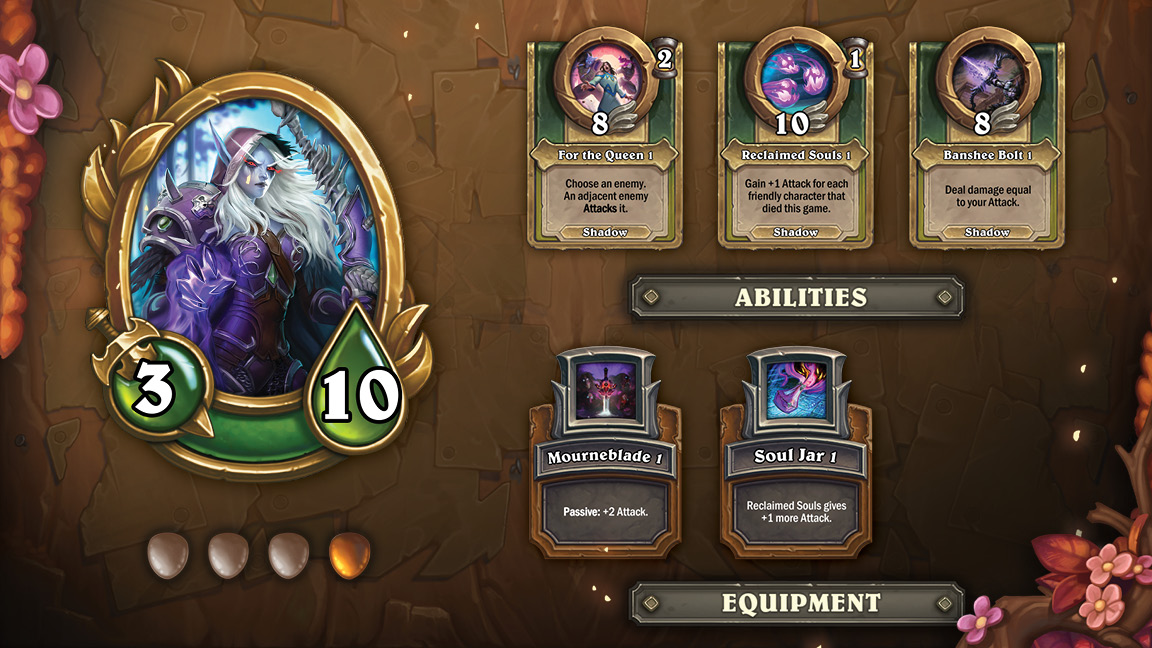
The complexity of solo content is ratcheted to another level in multiplayer because you can't mouse over your opponent's minions to see what they're going to do or even what abilities they have access to. Player knowledge is going to be vital to eking out wins at high levels, just as it is in Standard or Wild. The difference here is that nobody will have seven years of prior communal knowledge to rely on. The Mercenaries PvP experience asks players to jump in at the deep end and start butterfly stroking. Right now it remains to be seen how serious the competitive scene will be for Mercs, but rest assured the real grinders will have done their homework.
Gotta recruit 'em all?
If the biggest question about Mercenaries has been 'What the hell is it?', not far behind was 'Is it a pay-to-win gacha game?' Preorder bundles were added to the shop mere minutes after the reveal stream ended. These bundles include flashy cosmetic skins for famous Warcraft and Hearthstone characters like The Lich King, Sylvanas Windrunner, and… Diablo? Frankly, it looked like a cash grab and players reacted negatively, to put it mildly. Last week, game director Ben Lee told PC Gamer that he had hoped players would simply view the preorders as the best value possible, much like the preorders for new expansions. He also admitted that part of the problem was that the team is just used to doing preorders, so saw no reason not to. Now that the dust has settled, how expensive is it going to be to build a competitive Mercenaries roster?
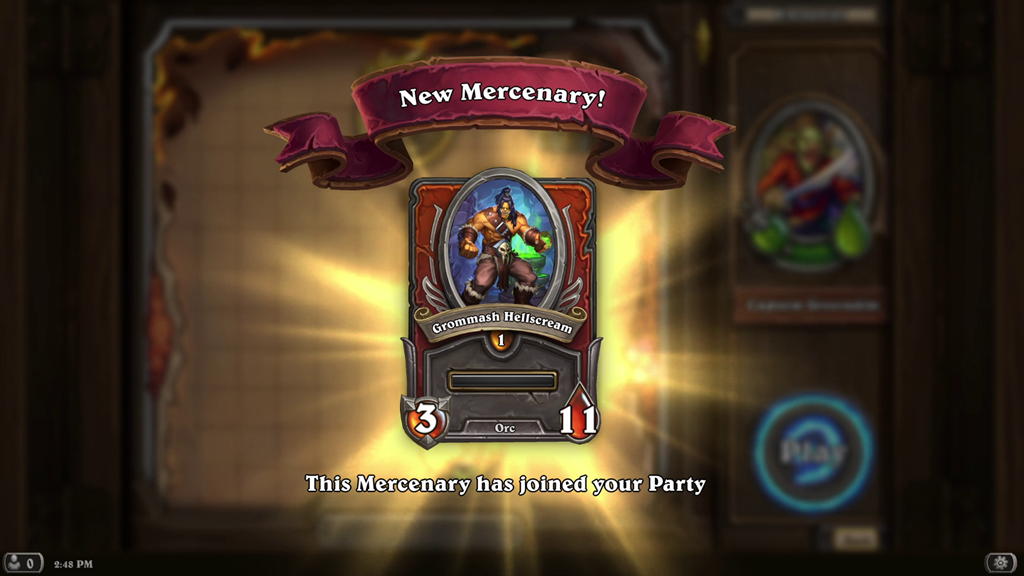
I never felt like I needed more mercs while playing solo or PvP content, nor did I feel like Legendaries were necessary to win.
It's hard to say exactly, having spent my time in a closed pre-release environment, but within an hour of playing PvE I had 14 Mercenaries available to me and the coins to level at least one ability on most of them. The biggest time sink was taking them through battles to level them and there is no way to accelerate that process with money. I also never felt like I needed more mercs while playing solo or PvP content, nor did I feel like Legendaries were necessary to win. Lee also noted that the game is not balanced around rarity, and some of the free starting Mercs remain among the most powerful in the whole game.
Easy accessibility is going to be crucial for Mercenaries, because the ultimate challenge the mode faces is one of core appeal. How does Blizzard go about convincing people that there's a new and completely different game inside the old game that's worth trying? That's a tough one, and I'm not sure the Hearthstone team knows how to reach the audience that lies beyond its existing playerbase. It doesn't help that Mercenaries now faces a huge uphill battle after the terrible livestream, especially given the ongoing mood music around Activision Blizzard.
Making a meal of it
If Standard and Battlegrounds are the entrées, then Mercenaries feels like a fancy side dish that makes the main meal more complete. And mac and cheese isn't such a bad thing to be! Solving the lack of perpetual singleplayer content in Hearthstone is a big deal—and the simultaneous addition of a new multiplayer mode with low variance and high complexity is a bonus that'll really scratch the itch for some, who may even make it their main mode. There are some early information overload pain points that will take time to get used to and some knottier long-term questions around competition and economics that can't be answered right now. But after a few days of playing, I feel the pull of the couch and just one more run. I wouldn't be surprised if many found themselves in the same spot.

